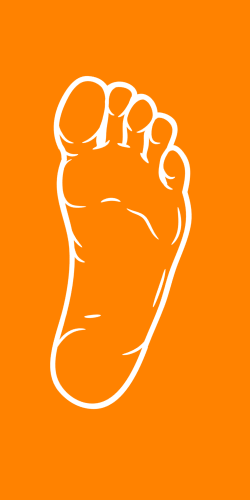Footcare at home
Guidance for people with dementia and those who support them.

This information has been written in partnership with podiatrists, who can help you by diagnosing, treating, rehabilitating and preventing foot, ankle and lower limb problems. This can assist you with sustaining an active and healthy lifestyle by helping you to maintain your mobility.
Personal footcare is important for everyone. Good foot health can reduce discomfort and pain, prevent health complications, maintain mobility and improve both independence and quality of life. Having healthy feet can help you to remain physically active and allow you to participate in the activities you enjoy. However, neglecting personal footcare can contribute to poor health and reduced wellbeing, which can be avoided. There are many things you can do for yourself or a family member can do to help look after your feet. If the time comes when you develop problems with your feet you may need to seek the help of a Podiatrist. Please note NHS Podiatry service do not offer a nail cutting service.
Helpful tips for looking after our feet at home:

Wear appropriate footwear
Keeping mobile and active is important to help us maintain our physical and mental wellbeing. Good footwear is essential to help protect our feet and support participation in activities. When looking for suitable footwear try a velcro fastening as these can help secure the foot, can be loosened to allow for any swelling during the day and are easier to fasten. A seam free top and a wide toe box allow room for toes and reduces the risk of damage to the skin. If buying shoes for someone check they fit properly as your foot shape can change over the years. At home avoid walking barefoot or in slippers as these can increase your risk of falls or damage to your skin. Instead try trainers or your normal shoes to protect and support your feet. Change your socks and tights daily. For people who are non-mobile warm socks may be more appropriate than footwear.

Check your feet every day
You should check your feet every day for any discolouration, blisters, breaks in the skin, pain or any signs of infection (i.e. redness, heat, swelling, pain, loss of function). A hand mirror can help with this. If you have any concerns seek help from your NHS Podiatry service or local HCPC registered private podiatrist for advice.

Wash your feet daily
Try to shower and wash your feet every day in warm water and with mild soap. Rinse them thoroughly and then dry them carefully, especially in between the toes before putting on your socks and shoes. If you are unable to get into the shower or bath regularly, it may be easier to wash your feet using a basin. Don’t soak your feet as this can reduce the natural oils of the foot, causing dry skin.

Put cream on your feet daily
Use moisturising cream on your feet daily, especially if your skin is dry. Don’t put any between your toes as it can lead to infections. Reduce hard skin by gently rubbing with a pumice stone or foot file. Just after you have washed your feet is best. You may have areas of yellowish thick skin on your toes or feet. These are calluses and corns which can be painful. DO NOT use any sharp implement to cut these as it it’s very dangerous. Do not use any creams or plasters which contain acids to remove them. If you are in pain, contact a podiatrist for advice.

Try to keep your toenails comfortable
You can file (1 to 2 times per week) or cut your toenails to help keep them comfortable.
If you choose to cut your toenails then it is best to use proper nail nippers. Do not cut them too short. It is safest to cut straight across, cutting down the sides can cause a wound or an ingrown toenail. Once cut, file with an emery board to ensure there are no sharp edges. If you have problems with the sensation in your feet, or your vision, ask a family member or carer for help. If you have been advised not to cut your own nails, or have any difficulty, please contact your NHS Podiatry service or local HCPC registered private podiatrist for advice.
If you’re unsure about something, it’s always better to call your podiatrist or GP than to take things into your own hands or ignore any issue. Podiatrists are still seeing patients based on current Government guidelines which are frequently updated. If you are worried about low mood or pain you can still seek medical assistance, the NHS is still there for you during this time. Speak to your GP or you can call NHS24 on 111.
Helpful links
Alzheimer’s Society
Dementia Connect Support Line :0333 150 3456
If you speak Welsh, call the Welsh-speaking support line on 03300 947 400
24 HOUR Wales Dementia Helpline
Twitter: @walesdementia
Facebook: www.facebook.com/WalesDementiaHelpline
The Royal College Of Podiatry
207 Providence Square, Mill Street, London, SE1 2EW
Website: rcpod.org.uk
Our Priorities

DECHRAU’N DDA
STARTING WELL
We want every child in Cardiff and Vale to have the opportunity to thrive. Our work focuses on children in vulnerable situations and the services that support them.

HENEIDDIO’N DDA
AGEING WELL
We know how hard it can be to find help when people need it the most. We want to make sure there is community support to help people stay as healthy as possible so they can carry on doing the things that matter most to them.

BYW’N DDA
LIVING WELL
As a Partnership we have worked together with people with a learning disability, their families, carers and the third and independent sector to produce a clear direction for the planning and delivery of adult learning disability services across the region over the next five years.
